We may not have the course you’re looking for. If you enquire or give us a call on +34 932716793 and speak to our training experts, we may still be able to help with your training requirements.
Training Outcomes Within Your Budget!
We ensure quality, budget-alignment, and timely delivery by our expert instructors.
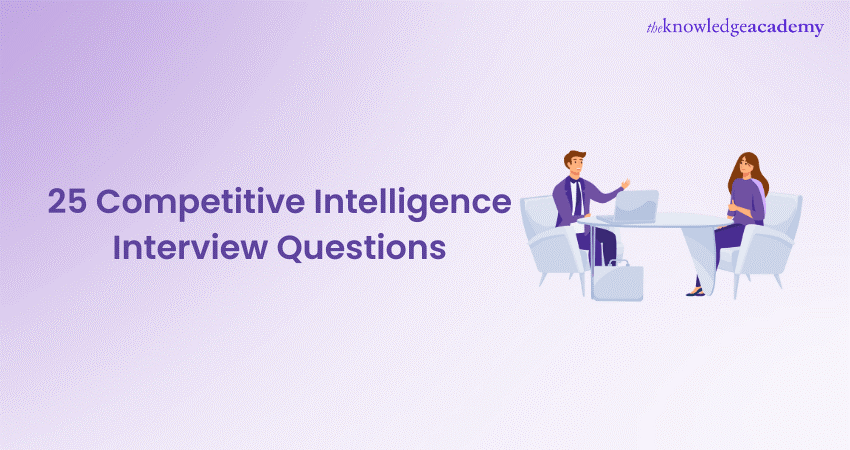
Competitive Intelligence (CI) is a crucial aspect of strategic business planning, involving the analysis of the business environment, competitors, and market trends. If you want to become a professional in analysing these competitors and strategising for an organisation, you must practice some commonly asked Competitive Intelligence Interview Questions, to excel in the interviews.
With these interviews, employers assess a candidate’s analytical, strategic, and industry-specific skills, before employing them as a CI professional. So, if you want to know more how to crack these interviews, read this blog. Here, we have discussed the most asked Competitive Intelligence Interview Questions and answers to help you stand out from the other candidates.
Table of Contents
1) Common Competitive Intelligence Interview Questions and Answers
a) What would you do if you knew a new startup was entering your industry?
b) Tell me some of the most essential qualities of a Competitive Intelligence Analyst.
c) Do you know any Competitive Intelligence tools?
d) What do you do to process analysing data and draw conclusions?
e) Can you tell me when you identified a weakness in your company's competitive advantage?
f) Would you use the access to confidential information about a competitor? Why or why not?
g) What do you do to analyse competitive data?
h) Do you understand the industry norms and practices for your role?
i) How would you handle a situation if you discovered a mistake in your analysis?
j) How do you stay up to date on industry trends?
2) Tips to crack Competitive Intelligence Interviews
3) Conclusion
Common Competitive Intelligence Interview Questions and Answers
In this section, we have discussed some of the most frequently asked questions in Competitive Intelligence Interviews. Read on further:
1) What would you do if you knew a new startup was entering your industry?
You can use this sample answer: “Upon discovering a new startup entering our industry, I would initiate a thorough competitive analysis. This involves understanding their business model, product offerings, target market, and unique value proposition. I would assess their strengths and potential threats to our business. Collaborating with various departments, I'd develop strategies to reinforce our competitive advantages, innovate in key areas, and possibly explore opportunities for differentiation or collaboration. Staying proactive and adaptive to market changes is crucial to maintaining our competitive edge.”
2) Tell me some of the most important qualities of a Competitive Intelligence Analyst.
You can add more to this sample answer: “Key qualities of a Competitive Intelligence Analyst include analytical thinking, keen attention to detail, and the ability to synthesise complex information. They must possess strong research skills to gather accurate data and a strategic mindset to interpret this data in the context of business objectives. Effective communication is essential to convey findings and recommendations. Additionally, they should demonstrate ethical judgment, particularly in handling sensitive information, and proactively stay informed about industry trends and competitor movements.”
3) Do you know any Competitive Intelligence tools?
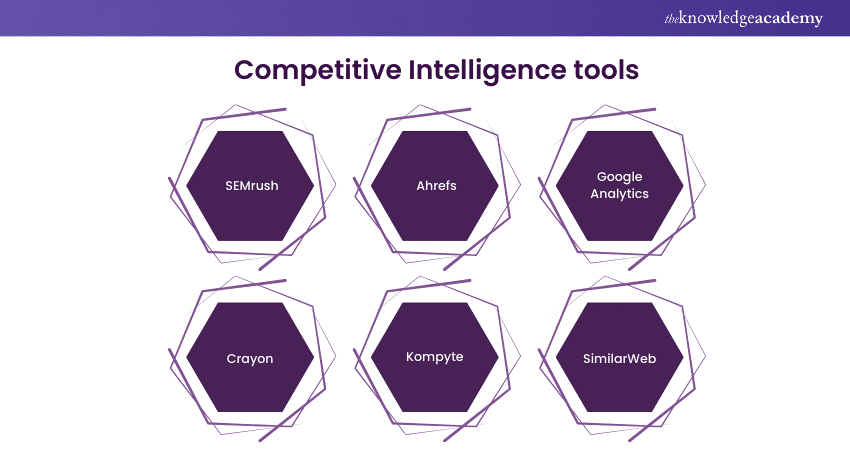
You can use this sample answer: “Yes, I am familiar with various Competitive Intelligence tools that aid in market analysis and monitoring competitor activities. Tools like SEMrush and Ahrefs provide insights into competitors' digital marketing strategies. For social media analysis, tools like Sprout Social and BuzzSumo are effective.
Additionally, platforms like Crayon and Kompyte offer comprehensive competitor monitoring and tracking changes in pricing, products, and digital presence. Combined with traditional research methods, these tools enable a robust analysis of the competitive landscape.”
4) What do you do to process analysing data and draw conclusions?
You can add more to this sample answer: “My approach to data analysis involves systematic steps. Initially, I collect relevant data from diverse sources, ensuring its accuracy and relevance. I then use statistical tools and methodologies to process this data, looking for patterns, trends, and anomalies.
While analysing, I consider the business context and objectives to ensure my interpretation aligns with our strategic goals. Finally, I conclude and develop actionable insights, presenting them in an understandable format, often supported by visual aids, to facilitate informed decision-making.”

5) Can you tell me when you identified a weakness in your company's competitive advantage?
You can use this sample answer: “In my previous role, I identified a gap in our digital customer engagement compared to our competitors. Through competitive analysis, I noticed that our competitors were leveraging social media more effectively to engage with younger demographics. I presented these findings to our marketing team, suggesting an enhancement of our digital marketing strategy. This led to a revamp of our social media approach, including more interactive content and targeted campaigns, which significantly improved our engagement rates and reached a broader audience.”
6) Would you use the access to confidential information about a competitor? Why or why not?
You can add more to this sample answer: “Ethical conduct is essential in Competitive Intelligence. I would not use confidential information about a competitor, as it breaches legal and ethical standards. Such actions can damage our company's reputation and lead to legal consequences.
Competitive Intelligence should be gathered through ethical means, such as public data, market research, and industry reports. Maintaining integrity upholds our company's values and ensures that our competitive strategies are sustainable and legally compliant.”
7) What do you do to analyse competitive data?
You can use this sample answer: “Analysing competitive data involves several steps. Initially, I identify key data points relevant to our business goals, such as market share, pricing strategies, product offerings, and marketing tactics. I then use analytical tools to process this data, looking for patterns and insights.
I consider both quantitative and qualitative data, ensuring a comprehensive view. The analysis also includes understanding the competitor's strengths and weaknesses and the impact of their strategies on the market. Finally, I translate these insights into actionable methods to enhance our competitive position.”
8) Do you understand the industry norms and practices for your role?
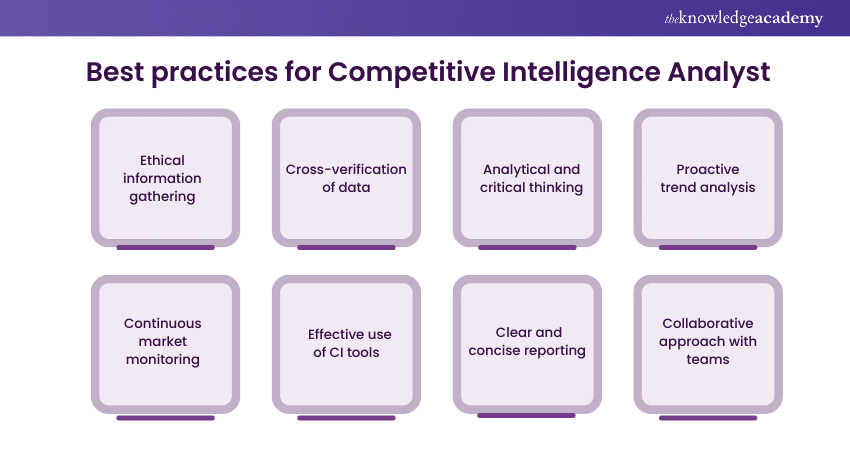
You can add more to this sample answer: “Yes, I thoroughly understand the industry norms and best practices for a Competitive Intelligence Analyst. This includes staying informed about legal and ethical guidelines for data gathering, respecting intellectual property rights, and maintaining confidentiality. I adhere to professional standards for analysis and reporting, ensuring that my work is accurate, reliable, and relevant to our business objectives. Additionally, I continually keep abreast of the latest trends and techniques in Competitive Intelligence to refine my skills and approaches.”
Do you want to become an expert in the Web Intelligence Launch Pad? Register now for our Business Objects Web Intelligence Reporter Course!
9) How would you handle a situation if you discovered a mistake in your analysis?
You could use this sample answer: “If I discovered a mistake in my analysis, my first step would be to assess the extent and impact of the error. I would immediately inform my supervisor or relevant stakeholders about the issue. Then, I would revisit the analysis to correct the mistake and double-check all data and assumptions.
I would also review the process to understand how the error occurred and implement measures to prevent similar mistakes in the future. Transparency, prompt action, and learning from errors are essential in maintaining the integrity and reliability of the analysis.”
10) How do you stay up to date on industry trends?
You can add more to this sample answer: “Staying updated on industry trends is vital for a Competitive Intelligence Analyst. I regularly read industry publications, follow key thought leaders on social media, and attend webinars and conferences. I also subscribe to relevant newsletters and reports from market research firms.
Networking with industry peers and participating in professional forums and groups provides additional insights. This continuous learning approach ensures that I am aware of emerging trends, technological advancements, and shifts in the competitive landscape, which is essential for practical analysis and strategy development.”
11) Give me an example of a time when your competitive analysis directly impacted a product decision.
Here is how you can answer this question: “In a previous role, my competitive analysis revealed that our main competitor was planning to launch a product with advanced features that our product lacked. I presented this finding to our product development team, leading to an accelerated timeline for our next product release with enhanced features. This proactive approach not only kept us competitive but also resulted in increased market share due to our product's superior capabilities.”
12) How do you identify and prioritise which competitors to focus on?
You can answer this question: “To identify and prioritise competitors, I first analyse market share and growth rates to identify direct competitors. Then, I consider factors like product similarity, target customer overlap, and market positioning. I prioritise competitors who pose the highest threat or offer the best learning opportunities. This prioritisation is dynamic and reviewed regularly to adapt to market changes.”
Are you interested in understanding the techniques to boost your productivity? Sign up now for our Business Objects Desktop Intelligence Advanced Reporter Course!
13) What are some of the metrics that you use to measure success in Competitive Intelligence?
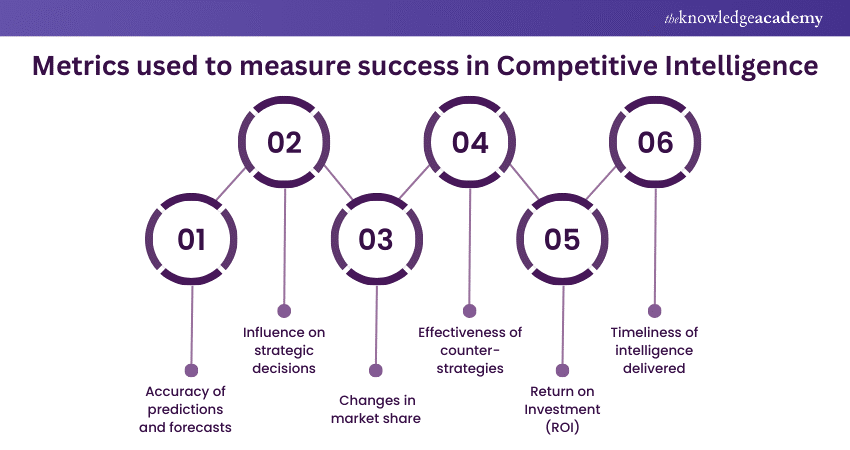
You can add more to this sample answer: “Success in Competitive Intelligence is measured through various metrics, such as the accuracy of predictions about competitor moves, the impact of intelligence on strategic decisions, and stakeholder feedback. Other metrics include market share changes, counterstrategies developed based on CI, and the efficiency of intelligence-gathering processes.”
14) How do you maintain the accuracy and reliability of your Competitive Intelligence data?
Here is how you can answer this question: “To maintain accuracy and reliability, I cross-verify information from multiple sources and stay updated with the latest market developments. Regularly updating our CI databases and conducting periodic reviews helps ensure data accuracy. Establishing strong relationships with internal stakeholders for information sharing also enhances data reliability.”
15) Tell me about some key challenges in Competitive Intelligence and how you address them.
You can add more to this sample answer: “Key challenges in Competitive Intelligence include rapidly changing market conditions, data overload, and distinguishing between noise and useful information. I address these by staying agile in my analysis, employing advanced data filtering techniques, and continuously refining intelligence parameters. Staying current with industry trends and leveraging technology for real-time updates are also critical.”
16) How do you communicate your findings and recommendations to different types of stakeholders?
You can add more to this sample answer: “When communicating findings, I tailor my approach based on the stakeholder's role and information needs. For executives, I provide strategic insights and high-level summaries. For product teams, detailed analyses with actionable recommendations are more suitable. Clear visualisations and focusing on how findings impact specific business areas ensures effective communication.”
17) What is an experience where you worked with cross-functional teams to gather and share Competitive Intelligence?
You could use this sample answer: “In a recent project, I collaborated with sales, marketing, and product development teams to gather and share Competitive Intelligence. I organised cross-functional meetings to discuss competitor strategies and market trends. This collaboration led to a more cohesive approach in developing counterstrategies and aligning our product roadmap with market needs.”
Enhance your understanding of database dimensional modelling. Sign up now for our Pentaho BI Training!
18) Tell me the difference between Competitive Intelligence and corporate espionage.
|
Aspect |
Competitive Intelligence |
Corporate Espionage |
|
Definition |
Ethical gathering and analysis of market and competitor information |
Illegal or unethical acquisition of confidential information |
|
Methods |
Uses legitimate and ethical means such as public data, market research |
Involves hacking, theft, bribery, or other illicit methods |
|
Purpose |
To inform strategic decisions and understand market dynamics |
To gain unauthorised access to proprietary information |
|
Legal and ethical status |
Legal and adheres to industry ethical standards |
Illegal and violates ethical standards |
|
Data sources |
Public records, news media, industry reports, public filings |
Secret or proprietary documents, insider information |
|
Transparency |
Transparent about sources and methods |
Involves secrecy and deception |
|
End goal |
Enhance business strategy and competitive positioning |
Gain unfair advantage through illicit means |
|
Impact on reputation |
Positive when conducted ethically |
Highly damaging, leading to legal consequences and loss of trust |
19) How have you used social media as a source of Competitive Intelligence?
You can add more to this sample answer: “Social media is a valuable source for Competitive Intelligence. I have used it to monitor competitors' marketing campaigns, customer feedback, and brand sentiment. By analysing competitors' social media activities, I've gained insights into their promotional strategies, product launches, and customer engagement tactics, informing our marketing strategies.”
20) Can you tell me when you adjusted your analysis due to changing market conditions or new information?
You could use this sample answer: “When a key competitor unexpectedly merged with another industry player, I had to adjust my analysis quickly. This merger significantly altered the competitive landscape, so I reassessed our position and re-evaluated our strategies considering this development. The revised analysis helped our company to realign its strategic priorities in response to the new market dynamics.”
21) How do you validate the credibility of third-party reports or data sources?
You can add more to this sample answer: “To validate third-party data, I cross-reference information with other reliable sources and check the reputation and track record of the data provider. I also evaluate the methodology and sample size of reports, and where possible, corroborate with primary research or insider insights to ensure the accuracy and credibility of the data.”
22) What role does Competitive Intelligence play in informing your company's strategic planning process?
Here is how you can answer this question: “Competitive Intelligence plays a critical role in strategic planning by providing insights into market trends, competitor strategies, and potential threats and opportunities. This information informs decision-making processes, helping to shape business strategies, identify new market opportunities, and anticipate competitor moves. It ensures that strategic planning is grounded in a realistic understanding of the competitive landscape.”
23) Give me an example of when your Competitive Intelligence efforts directly influenced a business decision.
You can add more to this sample answer: “In a previous role, my Competitive Intelligence efforts revealed a competitor’s weakness in customer service. Capitalising on this, we enhanced our customer service, which significantly increased customer satisfaction and loyalty. This strategic shift, informed by CI, directly contributed to a measurable increase in market share and customer retention rates.”
Improve your understanding of aligning the organisation with strategy with our Balanced Business Scorecard Training!
24) How do you handle situations where stakeholders disagree with your analysis or recommendations?
You can add more to this sample answer: “When stakeholders disagree with my analysis, I seek to understand their perspectives and concerns. I provide additional data and rationale to support my findings and am open to re-evaluating my analysis if new information is presented. Effective communication and a willingness to collaborate and adapt my recommendations help find a mutually agreeable solution.”
25) What measures do you take to maintain confidentiality when handling sensitive information?
Here is how you can answer this question: “To maintain confidentiality, I adhere to strict data security protocols, including encryption and secure storage of sensitive information. I maintain and monitor the access to that information. I also ensure compliance with legal and ethical guidelines regarding information handling and regularly update myself on these standards to safeguard sensitive information responsibly.”
Tips to crack Competitive Intelligence Interviews
Here are some tips to help you crack any future Competitive Intelligence Interviews:
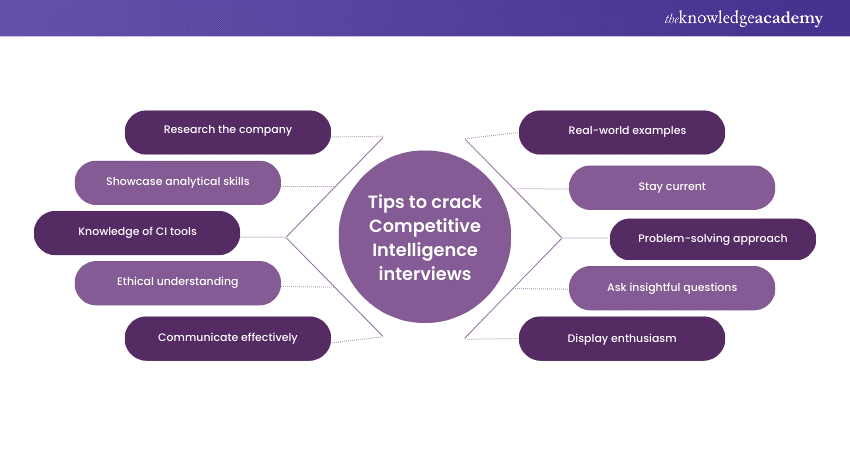
1) Research the company: Understand the company's products, market position, and competitors to tailor your responses.
2) Showcase analytical skills: Highlight your ability to analyse data, identify trends, and draw insights.
3) Knowledge of CI tools: Be prepared to discuss your experience with Competitive Intelligence tools and platforms.
4) Ethical understanding: Emphasise your commitment to ethical standards in gathering and using competitive information.
5) Communicate effectively: Demonstrate your ability to clearly and concisely present complex information.
6) Real-world examples: Share specific instances where your CI efforts positively impacted business decisions.
7) Stay current: Stay current with industry trends and competitive analysis techniques.
8) Problem-solving approach: Discuss your methodology for approaching and solving Competitive Intelligence challenges.
9) Ask insightful questions: Prepare questions about the company’s current CI strategies and challenges.
10) Display enthusiasm: Express genuine interest in Competitive Intelligence and its role in the company’s success.
Conclusion
We hope that these sample Competitive Intelligence Interview Questions and answers have given you insight into interviews to help you stand apart from competitors. These questions are crucial for evaluating your analytical skills, ethical understanding, and strategic thinking in Competitive Intelligence. These questions are pivotal in identifying professionals who can effectively navigate and contribute to the complex landscape of market competition.
Learn how to use Tableau to improve productivity with our Tableau Desktop Training. Sign up now!
Frequently Asked Questions
Upcoming Office Applications Resources Batches & Dates
Date
 Business Objects Web Intelligence Reporter Course
Business Objects Web Intelligence Reporter Course
Thu 1st Jan 1970







 Top Rated Course
Top Rated Course


 If you wish to make any changes to your course, please
If you wish to make any changes to your course, please


